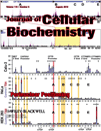
Autophagy
Scope & Guideline
Unlocking the Secrets of Cellular Recycling
Introduction
Aims and Scopes
- Mechanisms of Autophagy Regulation:
Research in this area explores the molecular pathways and regulatory mechanisms that control autophagy, including the role of autophagy-related proteins, signaling pathways like mTOR, AMPK, and the interplay with cellular stress responses. - Autophagy and Disease:
This scope addresses the implications of autophagy in various diseases, such as neurodegenerative disorders, cancer, metabolic diseases, and infections, highlighting how autophagy can be both protective and detrimental depending on the context. - Cellular and Organismal Functions of Autophagy:
Studies investigate the role of autophagy in cellular homeostasis, differentiation, and development, as well as its contributions to organismal health, including aging, immunity, and tissue regeneration. - Innovative Methodologies in Autophagy Research:
The journal emphasizes novel experimental approaches and technologies for studying autophagy, including advanced imaging techniques, genetic manipulation, and bioinformatics tools, providing insights into autophagic processes. - Therapeutic Targeting of Autophagy:
Research focuses on potential therapeutic strategies aimed at modulating autophagy for disease intervention, including the development of drugs that enhance or inhibit autophagic processes to treat various conditions.
Trending and Emerging
- Mitophagy and Mitochondrial Quality Control:
A surge in research focused on mitophagy, the selective degradation of mitochondria, underscores its critical role in maintaining cellular health, particularly in the context of neurodegenerative diseases and metabolic disorders. - Autophagy in Cancer Therapy:
Emerging studies are increasingly exploring the dual role of autophagy in cancer, both as a tumor suppressor and promoter, leading to novel therapeutic strategies that target autophagic processes to improve cancer treatment outcomes. - Autophagy and Immune Response:
There is a growing interest in the intersection of autophagy and immunology, particularly how autophagic processes influence immune responses and the role of autophagy in pathogen clearance and inflammation. - Nutrient Sensing and Autophagy:
Research is trending towards understanding how nutrient availability and metabolic states regulate autophagy, reflecting a more integrated view of autophagy in metabolism and energy homeostasis. - Role of Autophagy in Aging and Longevity:
Studies investigating the relationship between autophagy, aging, and longevity are gaining prominence, focusing on how autophagy contributes to cellular maintenance and the promotion of healthy aging.
Declining or Waning
- Basic Mechanistic Studies:
There appears to be a waning interest in purely mechanistic studies that do not connect to broader biological implications or therapeutic applications, as researchers increasingly focus on the translational aspects of autophagy. - Plant Autophagy Mechanisms:
Research specifically centered on plant autophagy mechanisms has decreased, possibly due to a shift in focus towards mammalian systems and disease-related studies, which are perceived as having more immediate relevance to human health. - Historical Perspectives on Autophagy:
Papers focusing on historical reviews or theoretical discussions about the evolution of autophagy mechanisms have become less common as the community prioritizes original research and current findings over retrospective analyses. - Single-Cell Autophagy Studies:
There is a noticeable reduction in publications solely dedicated to single-cell autophagy studies, as researchers are now more inclined to explore autophagy in the context of multicellular systems and complex tissues. - Non-canonical Autophagy Pathways:
Research on non-canonical autophagy pathways, while still relevant, appears to be less emphasized compared to more established canonical pathways, as the field moves towards integrating findings into broader physiological contexts.
Similar Journals

Cell Death & Disease
Advancing understanding of cellular dynamics and disease.Cell Death & Disease, published by SpringerNature, is a premier open-access journal dedicated to disseminating high-quality research on the mechanisms and implications of cell death, disease pathology, and therapeutic responses. Since its inception in 2010, the journal has quickly established itself within the top tier of academic publishing, achieving a notable impact factor and earning Q1 rankings in several critical categories including Cancer Research, Cell Biology, Cellular and Molecular Neuroscience, Immunology, and Medicine (miscellaneous). With its commitment to open access, Cell Death & Disease ensures that groundbreaking research is available to a global audience, fostering collaboration and advancing knowledge across disciplines. Residing at the forefront of crucial scientific discourse, this journal not only attracts submissions from leading researchers but also significantly influences the fields of molecular biology, immunology, and neurology. By bridging the gap between basic science and clinical applications, it provides vital insights for professionals, academicians, and students alike.

BMC Molecular and Cell Biology
Illuminating the pathways of modern biological research.BMC Molecular and Cell Biology is a forward-thinking open-access journal published by BMC, specializing in the vital fields of molecular biology and cell biology. Since its inception in 2019, the journal has carved a niche for itself, ranking in the Q3 quartile in both Cell Biology and Molecular Biology categories as of 2023. With an ISSN of N/A and an E-ISSN of 2661-8850, the journal provides a platform for groundbreaking research, high-quality reviews, and innovative methodologies. Situated in the United Kingdom, BMC Molecular and Cell Biology promotes a diverse range of studies, addressing fundamental questions in biology that resonate with both experts and new researchers alike. The journal's commitment to open access ensures that valuable findings are readily available to the global scientific community, fostering collaboration and knowledge-sharing across disciplines. Researchers aiming to contribute to the field of cell and molecular biology will find this journal an indispensable resource for both publishing and staying informed on the latest advances.

Current Opinion in Physiology
Advancing Insights in the Dynamic World of PhysiologyCurrent Opinion in Physiology, published by Elsevier, is a leading journal dedicated to the dynamic field of physiology. With an E-ISSN of 2468-8673, this journal provides a platform for the latest insights and perspectives, reflecting the evolving landscape of physiological research. Operating from the United Kingdom, the journal holds a respectable impact factor and is ranked Q2 in both general physiology and medical physiology categories, highlighting its prominence among the global academic community. With Scopus rankings placing it in the 64th and 60th percentiles within its respective categories, Current Opinion in Physiology serves as an essential resource for researchers, professionals, and students eager to stay informed about innovative theories and emerging trends in physiology. The publication emphasizes high-quality reviews that summarize current knowledge and future directions, ensuring readers gain valuable insights applicable in both clinical and research settings.

Cell Communication and Signaling
Unleashing Insights into Cell Communication DynamicsCell Communication and Signaling is a premier peer-reviewed journal published by BMC that has made significant contributions to the fields of biochemistry, cell biology, and molecular biology since its establishment in 2003. As an open access journal, it offers unrestricted access to high-quality research, fostering collaboration and innovation among scientists around the globe. The journal is distinguished by its Q1 ranking in all three relevant categories for 2023, underscoring its critical role in advancing the understanding of cellular communication mechanisms and signaling pathways. Positioned within the United Kingdom, Cell Communication and Signaling has been an invaluable resource for researchers, professionals, and students alike, ensuring that the latest findings are accessible to a diverse range of audiences. With an impressive Scopus ranking—placing it in the top percentiles within its subject areas—this journal continues to set the standard for excellence in the pursuit of understanding complex cellular interactions.

JOURNAL OF RECEPTORS AND SIGNAL TRANSDUCTION
Fostering Collaboration in Molecular BiologyJOURNAL OF RECEPTORS AND SIGNAL TRANSDUCTION, published by TAYLOR & FRANCIS LTD, is a premier academic journal dedicated to advancing our understanding of receptor biology and signal transduction mechanisms. With an ISSN of 1079-9893 and an E-ISSN of 1532-4281, this journal has maintained a reputable standing since its inception in 1980, continually addressing pivotal topics in biochemistry, cell biology, and molecular biology. As evidenced by its 2023 Scopus rankings, which place it in the 64th percentile for Biochemistry and Genetics and Molecular Biology, JOURNAL OF RECEPTORS AND SIGNAL TRANSDUCTION remains a vital source for cutting-edge research, providing insights that are essential for both academic and practical applications. Although the journal currently offers limited open access options, it stands out in the Q2 and Q3 quartiles of its respective categories, making it an invaluable resource for researchers, professionals, and students aiming to stay abreast of the latest findings and methodologies in receptor and signaling research. The journal's commitment to disseminating high-quality research underscores its significance within the scientific community, fostering innovation and collaboration across disciplines.

Biochemistry and Cell Biology
Elevating scientific discourse with impactful research and reviews.Biochemistry and Cell Biology, published by Canadian Science Publishing, is a prestigious journal that has been instrumental in advancing the fields of biochemistry, molecular biology, and cell biology since its inception in 1986. With an impressive scope spanning innovative research findings to comprehensive reviews, this journal serves as a vital resource for researchers, professionals, and students alike. Currently positioned in the Q2 quartile in Biochemistry and Q3 quartiles in both Cell Biology and Molecular Biology, it reflects a robust contribution to scientific discourse, placing it among reputable publications in its field. The journal boasts notable rankings within the Scopus database, highlighting its impact and relevance, and continues to be a valuable platform for disseminating pivotal research. By providing access to a wide array of articles, the journal remains committed to fostering knowledge and collaboration in the scientific community.

TRENDS IN CELL BIOLOGY
Transforming Understanding of Cellular ComplexityTRENDS IN CELL BIOLOGY, published by CELL PRESS, is a premier journal in the field of cell biology, recognized for its high-impact contributions since its inception in 1991. As a distinguished member of the Q1 quartile within its category, the journal holds an impressive Scopus ranking of #8 out of 285, placing it in the 97th percentile of the field, which underscores its reputation for excellence. The journal serves as an essential resource for researchers, professionals, and students who are engaged with groundbreaking advancements in biochemistry, genetics, and molecular biology. Although it is not open access, it provides critical insights into the latest trends, reviews, and advancements in cell biology, making it a crucial tool for anyone committed to understanding the complexities of cellular systems. With a focus on innovative and transformative research, TRENDS IN CELL BIOLOGY continues to shape the discourse in cell biology and enhance the scientific community's knowledge.

BIOCELL
Exploring the Depths of Biochemistry and GeneticsBIOCELL is a distinguished peer-reviewed journal dedicated to the field of Cell Biology, published by TECH SCIENCE PRESS. Since its inception in 1995, the journal has been at the forefront of disseminating innovative research, with converged publication years extending from 1995 to 2013 and from 2015 to 2024. Although it currently holds a Q4 ranking in the Cell Biology category according to the 2023 category quartiles, BIOCELL aims to foster advancements by providing a platform for researchers, professionals, and students to share their findings in biochemistry, genetics, and molecular biology. The journal is available in both print (ISSN: 0327-9545) and digital formats (E-ISSN: 1667-5746) and seeks to attract contributions that enhance scholarly dialogue and understandings of cellular mechanisms and innovations. With a commitment to quality research and critical discourse, BIOCELL plays an important role in nurturing the scientific community within Argentina and beyond, offering vital insights that contribute to the advancement of the life sciences.

JOURNAL OF CELLULAR BIOCHEMISTRY
Unraveling the Complexities of BiochemistryJournal of Cellular Biochemistry is a premier academic journal dedicated to advancing the field of biochemistry and cellular biology. Published by Wiley, this influential journal has a significant impact factor that underscores its relevance and authority within the scientific community. With its ISSN 0730-2312 and E-ISSN 1097-4644, the journal has been on the frontier of research since its inception in 1982, and is expected to continue publishing cutting-edge studies through 2024. As evidenced by its ranking in the 2023 Scopus Quartiles, it holds a rank of Q2 in Biochemistry and Q3 in both Cell and Molecular Biology, placing it among the top tiers of scientific journals in these disciplines. The Journal of Cellular Biochemistry serves as a vital resource for researchers, professionals, and students alike, providing a platform for the dissemination of innovative ideas and findings that shape our understanding of cellular processes and biochemical pathways. Though it does not currently offer Open Access options, its robust peer-review process ensures that each publication meets the highest academic standards, thus solidifying its esteemed position in the landscape of biochemical research.

CELLULAR SIGNALLING
Connecting Discoveries in Molecular BiologyCELLULAR SIGNALLING, published by Elsevier Science Inc, is a premier journal within the realm of Cell Biology, boasting an impressive Q2 category ranking as of 2023. With an ISSN of 0898-6568 and an E-ISSN of 1873-3913, the journal has established itself as a critical platform for advancing the understanding of cellular mechanisms and signal transduction pathways since its inception in 1989. Covering a vast array of topics in Biochemistry, Genetics, and Molecular Biology, it ranks notably at 87 out of 285 in the Scopus list, placing it in the 69th percentile among its peers. The journal serves as an invaluable resource for researchers, professionals, and students seeking high-quality, impactful studies that drive forward the field of cellular biology. While it operates under traditional subscription access, its highlights include rigorous peer-reviewed articles, reviews, and insights that continue to shape current scientific discourse.